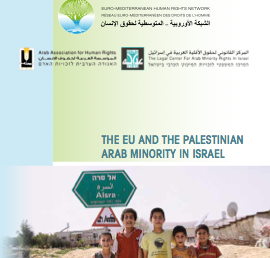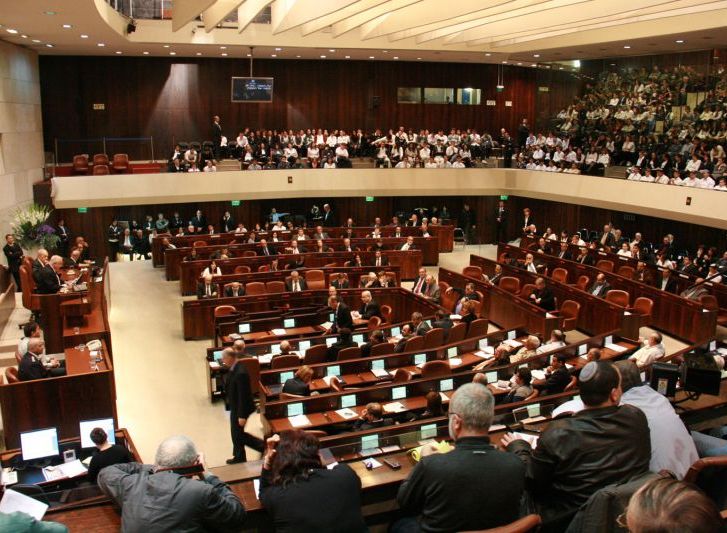Adalah: 6-5 Majority of Supreme Court Approves Most Racist Law in State of Israel, Preventing Families' Unification on the Basis of National Belonging: Arab-Palestinian
Adalah: Even Court in South Africa in 1980 During Apartheid Refused to Approve Similar Orders on Grounds they Contradicted the Right to a Family
Attorney Hassan Jabareen (General Director of Adalah): Today, the Supreme Court Instituted Three Tracks of Citizenship on Basis of Ethnic Background: A Direct Track for Jews Under the Law of Return; A Middle Track for Foreigners According to the Graduated Procedure; and the Harshest Track, for Arab Citizens
Today, 14 May 2006, a majority of the Supreme Court of Israel, in a split of 6-5 Justices, issued a 263-page decision in which it dismissed a petition filed by Adalah, and six other petitions joined by the Court to the petition, including a petition filed by the Association for Civil Rights in Israel. The petitions demanded the annulment of the Nationality and Entry into Israel Law (Temporary Order) 2003, which violates the right of Israeli citizens to family unification with their Palestinian spouses from the Occupied Palestinian Territories (OPTs).
The majority of Supreme Court Justices, who approved the law as constitutional, were: Justices Mishael Cheshin, Miriam Naor, Asher Gronis, Yonatan Adiel, Eliezer Rivlin and Edmond Levy. Dissenting Justices of the minority opinion were: Chief Justice Aharon Barak and Justices Dorit Beinisch, Ayala Procaccia, Salim Joubran and Esther Hayut.
Justice Cheshin, who led the majority position, stated that citizens of Israel have no constitutional right which authorizes the Court to cancel a law enacted by the Knesset, according to which “foreign” spouses are not allowed to receive legal status in Israel. According to Heshin, the right to human dignity does not include any constitutional obligation on the state to allow “foreigners” married to Israeli citizens to enter the state. Cheshin added that, in his opinion, the “State of war against the Palestinian Authority” justifies the law, which aims to prevent the entry of elements hostile to the security of the state into Israel. Justice Levy indicated that the law is unconstitutional, but that the petitions must nonetheless be dismissed in order to give the Knesset the chance to amend it. The remaining Justices from the majority position ruled that although the law violates constitutional rights, it is proportionate.
Supreme Court Chief Justice Aharon Barak, in his articulation of the minority position, stated that, “The issue concerns the right of Israeli citizens of the state to family life and equality, which derive from the constitutional right to human dignity, as espoused in the Basic Law [Human Dignity and Liberty]… A citizen has the right to conduct a family life with a spouse in Israel. There [in Israel] is his [or her] house and his [or her] society, there is his [or her] historical, cultural and social roots…this violation of rights is directed against Arab citizens of Israel. As a result, therefore, the law is a violation of the right of Arab citizens in Israel to equality.”
Chief Justice Barak, together with the other Justices of the minority opinion, further decided that the law is disproportionate, as it removes the possibility of conducting specific and individual checks on a case-by-case basis; rather, the law strips rights in a collective and sweeping manner. Therefore, Chief Justice Barak and the other Justices from the minority opinion reached the conclusion that the law is unconstitutional and should be cancelled.
In its response to the decision, Adalah pointed out that, on this day, the Supreme Court effectively approved the most racist legislation in the State of Israel; legislation which bars the unification of families on the basis of national belonging: Arab-Palestinian. Drawing a comparison, Adalah added that, “In 1980, during Apartheid, a Court in South Africa refused to approve orders similar to the Nationality and Entry into Israel Law, because they contradicted the right to a family.” Adalah's General Director Attorney Hassan Jabareen emphasized that today, the Supreme Court has instituted three tracks of citizenship on the basis of ethnic background: a direct track for Jews under the Law of Return; a middle track for foreigners according to the graduated procedure; and the harshest track, for Arab citizens.
Adalah Attorneys Jabareen and Orna Kohn filed the petition to the Supreme Court in August 2003, challenging the constitutionality of the racist law and demanding its cancellation. The law denies Palestinian Citizens of Israel the right to acquire any status in Israel for their spouses from the OPTs solely on the basis of their national belonging. Since the enactment of the law, it has forced thousands of affected families to separate, live outside of Israel, or live illegally within Israel under constant risk of arrest and deportation.
The petition was filed in Adalah's own name and on behalf of the El-Sana and Tbilah families, affected by the law; Shawqi Khatib, the Chairperson of the High Follow-up Committee for the Arab Citizens in Israel; and the Arab Members of Knesset: Muhammed Barakeh, Dr. Azmi Bishara, 'Abd al-Malek Dahamshe, Talab El-Sana, Issam Makhoul, Wasel Taha, Dr. Ahmad Tibi, and Dr. Jamal Zahalka.
As Adalah argued in the petition, the law severely violates human rights and fundamental freedoms under domestic and international law, including the rights to equality, liberty, privacy, and family life. The law discriminates against Arab citizens of Israel, the vast majority of Israeli citizens who marry Palestinians from the OPTs.
Adalah filed the petition immediately following the Knesset's passage of the law in July 2003, anchoring into law a prior government decision from May 2002. The Knesset extended the law three times, despite its definition as a "temporary order.” In July 2005, the Knesset passed a number of amendments to the law, allegedly to allow family unification between residents of the OPTs and Israeli citizens. However, the new amendments allow individuals to apply at most for temporary visit permits in Israel, and still bar individuals from submitting applications for residency and citizenship, leaving them ineligible for work permits, social benefits, etc. As Adalah argued before the Supreme Court, the new amendments to the law contain additional criteria including age and gender-related stipulations which impose a sweeping ban on applications for temporary visit permits from all Palestinian men under 35 and all Palestinian women under 25 years of age. These criteria were arbitrarily decided upon and unsupported by any factual evidence, Adalah emphasized. A further amendment provides that no status will be granted to Palestinians who are related to an individual whom security officials suggest might constitute a security threat to the State of Israel. Thus, as Adalah argued before the Court, under the amended law, the most basic of human rights can be revoked purely on the basis of family relations, over which individuals have no control.
Since filing the petition almost three years ago, Adalah has repeatedly challenged the state's claim that the law was enacted as a justified security measure. The Attorney General claimed before the Court that the law is an essential measure for safeguarding Israeli security, because Palestinians from the OPTs who have obtained residency status in Israel via family unification have been increasingly involved in terror activity. However, the state could in fact point to only 25 individuals, from a group of thousands of status-receivers, whom it interrogated for alleged involvement in terrorist activities, without providing full details. In response, Adalah stated that even if this data is reliable the numbers constitute a minute number of people, and thus the law is completely disproportionate. Further, the state possesses many other tools and mechanisms including the "graduated procedure" for awarding legal status, which grants the government wide authority to conduct individual criminal and security background checks on all status-seekers.
Various United Nations committees have called on Israel to revoke the ban on family unification. For example, the UN Human Rights Committee (UN HRC), in para. 21 of its final Concluding Observations on Israel from August 2003, the UN Committee on the Elimination of Racial Discrimination (UN CERD) and the UN Committee on the Elimination of Discrimination Against Women (UN CEDAW) have all condemned the law, in addition to the European Parliament and international human rights organizations the International Federation for Human Rights (FIDH), Amnesty International and Human Rights Watch.


















